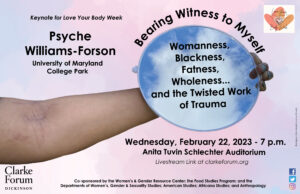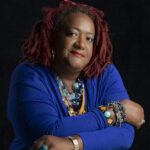Anita Tuvin Schlechter Auditorium – 7 p.m.
 Love Your Body Week Keynote
Love Your Body Week Keynote
Bearing Witness to Myself: Womanness, Blackness, Fatness, Wholeness and…the Twisted Work of Trauma
Psyche Williams-Forson, University of Maryland College Park
This discussion will engage the intersections of womanness, blackness, fatness, and wholeness to consider different definitions of health and personal agency. Creating healthy bodies requires a redefinition of the food stories that define African American culture. And it requires that we push back against acts that demonize and degrade the foods that help communities “to keep on keepin’ on.” Redefining and pushing back is part of the work that helps to heal bodies as well as minds. Healing occurs when we consider the whole person—the cultural, spiritual, biomedical, economic, and social being and when we allow people to live lives that empower and strengthen them without shame or fear of being shamed.
The event is sponsored by the Clarke Forum for Contemporary Issues and co-sponsored by the Women’s & Gender Resource Center, and the departments of women’s, gender & sexuality studies; American studies, Africana studies; anthropology; and the Food Studies Program. The program is part of Love Your Body Week programming.
Topic Overview written by Shayna Herzfeld ’25
Biography (provided by the speaker)

Source: Portrait of Psyche Williams-Forson, M.A. ’94, Ph.D. ’02, Professor, Department of American Studies, BSOS.
Race Feature, TERP, Winter 2015.
Dr. Psyche Williams-Forson is professor and chair of the Department of American Studies at the University of Maryland College Park. She is an affiliate faculty member in the School of Theatre, Dance, and Performing Studies and the Departments of African American Studies, Anthropology, The Harriet Tubman Department of Women, Gender, and Sexuality Studies, and the Consortium on Race, Gender, and Ethnicity. Williams-Forson is the author of Eating While Black: Food Shaming and Race in America (UNC Press 2022); Taking Food Public: Redefining Food in a Changing World, a co-edited collection w/Carole Counihan, (Routledge 2013); and, the award-winning Building Houses out of Chicken Legs: Black Women, Food, and Power (UNC Press 2006). She is known nationally and internationally for her pioneering work in building the scholarly subfield of Black food studies and has published numerous articles on this aspect of the material lives of African Americans in the United States from the late 19th century to the present. Her work covers topics like Black women, food, and power; food and literature; food and sustainability; race, food, and design thinking; eating and workplace cultures; as well as the historical legacies of race and gender (mis)representation, with (and without) food, and more. She has also been interviewed on several podcasts and by NPR, Radio New Zealand, the Associated Press, the Washington Post, Huff Post, and The New York Times, among others. She has also been featured in documentaries such as Netflix’s Ugly Delicious and The Invisible Vegan.
